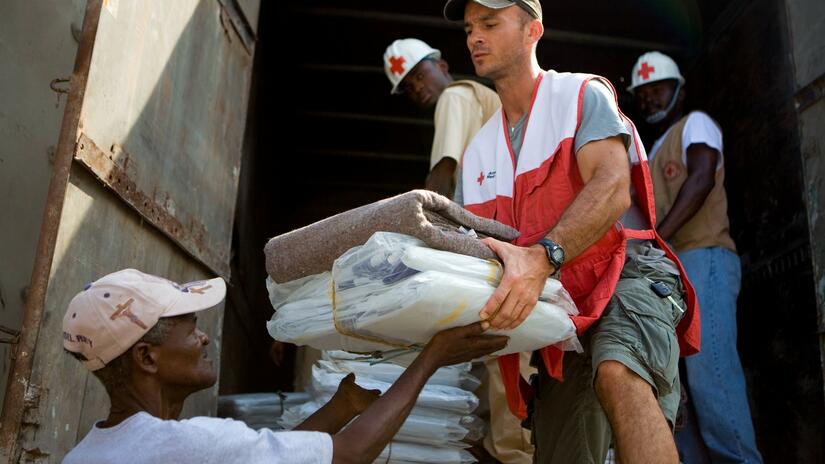Supporting local humanitarian action
The IFRC is committed to supporting humanitarian action that is as local as possible, as international as necessary. Our 191 National Red Cross and Red Crescent Societies are the lead actors in preparing for, responding to and helping communities recover from emergencies. In times of increased need, our global disaster response system effectively supports and coordinates their lifesaving work.
Why are National Societies uniquely placed to support communities before, during and after disasters?
Their permanent presence within communities
Their role as auxiliaries to public authorities
Their unparalleled reach
Our global disaster response system
If a crisis occurs that overwhelms a National Society’s local ability to respond, they can request support from the IFRC’s global disaster response system.
This includes finance mechanisms and surge services that enable our network to scale up effectively in a crisis. We do so in a systematic and coordinated way that is accountable to the people affected and that helps to strengthen the capacity of National Societies.
The level of assistance the IFRC provides to National Societies depends on the scale and complexity of the emergency, as well as the needs of the affected populations.
Levels of assistance
Country support
Our nearest Country Office (CO) or Country Cluster Support Team (CCST) will take the primary role in supporting the National Society. They can help plan, coordinate and deliver IFRC support on the ground.
Regional support
IFRC Regional Offices (RO) take the lead in setting and maintaining the overall strategic direction of the operation. They also request and coordinate international support as efficiently and effectively as possible for all operations in their region.
Global support
IFRC headquarters takes overall strategic direction for all our emergency operations worldwide. It ensures global coherence, compliance with our global policies and standards, and can provide global support to National Societies in the form of people, money or expertise.
Funding mechanisms
IFRC Network Country Plans
Country plans detail National Societies' planned action and funding requirements for the year, including any ongoing emergency operations and long-term programmes. They include support to disaster risk reduction and preparedness, as well as response.
Disaster Response Emergency Fund
The Disaster Response Emergency Fund (DREF) is a central pot of money through which we can quickly and efficiently provide funding to National Societies for early action before a disaster, or for immediate response when a disaster strikes.
Emergency Appeals
We launch Emergency Appeals for large scale and complex disasters affecting lots of people. These responses typically involve longer-term recovery support—such as support to livelihoods, multiple cash transfers, long-term shelter support and capacity building for National Societies.
Surge mechanism
Our surge mechanism is accountable, fit for purpose and an important part of our global disaster response system. We deploy the right people and services to the right place at the right time—always as locally as possible, as internationally as necessary.
Through our surge mechanism, we are helping build the capacity of National Society staff and volunteers and supporting disaster preparedness initiatives.
Learn more about our global response surge tools below.
Global surge services
Rapid Response
Human resources are one of the most crucial components of disaster preparedness and emergency response. Through our network, the IFRC can deploy specialized Rapid Response personnel on a short-term basis (up to 3 months) to support emergency humanitarian operations around the world.
Emergency Response Units
Emergency Response Units (ERUs) are teams of specialized personnel and equipment that can deploy at short notice to sudden and slow on-set disasters. They can provide specific preventive as well as life-saving services when local facilities are destroyed, overwhelmed or non-existent.
Heads of Emergency Operations
Heads of Emergency Operations (HEOPs) are diverse and experienced staff who provide operational and strategic leadership in the IFRC’s largest and most complex emergency operations. They also support National Societies to plan and implement appropriate responses.
Surge video series

An American Red Cross worker hands supplies to a volunteer from the Haiti Red Cross Society following the earthquake in 2010
Photo: American Red Cross/Talia Frenkel
What is surge?
What are the key concepts and principles in emergency response for each sector?
What tools and different resources does the IFRC offer to help National Societies respond?
Discover our surge video series on the IFRC Learning Platform to learn more about our global surge services and how we have improved them in recent years.
